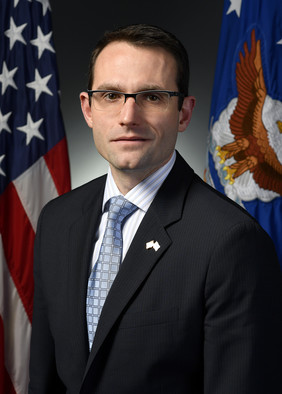The Pentagon is “a little bad about classifying,” and it needs to bring more of its quantum research “out into the light” in order “to continue to get the right talent,” according to the head of Air Force R&D.
Attracting top talent is always a challenge for any organization, but the head of Air Force R&D hinted that declassifying research could attract more quantum researchers into joining the Space Force and other careers in the Pentagon.

Dr. Will Roper
“We’re just a little bad about classifying. We need to bring more of this stuff out into the light where we can, safely, so we continue to get the right talent to come help us push the ball forward” — Dr. Will Roper
Today, the United States Air Force Quantum Collider event kicked off with the purpose of accelerating innovation into quantum computing and to demystify how quantum will change the world we live in.
Quantum Collider opening highlights:
- Quantum Collider is a two-day event to “expedite the advancement and innovation of quantum technologies”
- Air Force Research Laboratory will award up to 36 contracts to small businesses
- Air Force could award up to $5.4 million to small businesses that develop quantum technologies for the Nation’s warfighters
- Declassified information and disclosure may attract top talent, inspire more people to join Space Force, Air Force
In his opening keynote, Dr. Will Roper, Assistant Secretary of the Air Force for Acquisition, Technology and Logistics, said that acquiring top talent starts with getting young people excited about the potentials of quantum science, so they will want to go work for the Space Force and other branches of the Pentagon.
“The fact that you can be in two places at once […] the fact that we can inspire people and make them feel like if they want that to be their career, and they want to work towards these culminating events like Q-Day, they should come work in the United States Air Force and Space Force,” said Dr. Roper.
Dr. Roper then hinted that what actually might attract more people to work with the military on quantum technology is disclosure.
“Historically, we have taken on big challenges, and we still do. We’re just a little bad about classifying,” he said.
“We need to bring more of this stuff out into the light where we can, safely, so we continue to get the right talent to come help us push the ball forward,” Dr. Roper added.
Barrett, Rogers plan to declassify black space programs https://t.co/D8LOavDUIE pic.twitter.com/lRds2zGuze
— Defense News (@defense_news) December 8, 2019
Dr. Roper’s words echo that of Air Force Secretary Barbara Barrett, who last year expressed her concern that when it came to military space programs, there was “much more classified than what needs to be” while Congressman Mike Rogers said these programs were “overwhelmingly classified.”
Barrett said, “Declassifying some of what is currently held in secure vaults would be a good idea,” but she didn’t mention specifically what type of information could be declassified, and neither did Dr. Roper for that matter.
If the Pentagon came out and said it had ultra-advanced quantum technology that was previously thought to only have existed in science fiction, such as teleportation, warp drives, extra dimensional travel, or instant messaging from the future, then that would probably turn some heads.
Stargates, wormholes, extra dimensions: DIA declassifies $22M research via FOIA
Turning back to reality, Dr. Roper said that quantum technology was a game changer and that the US must lead the charge over adversaries like China and Russia.
“When you look at what can be possible with quantum encryption, quantum communication, quantum sensing, quantum computing — we simply can’t let that future be up in the air” — Dr. Will Roper
“It’s typical of things that will be game changing, that the history our future will write, will not be the same one we forecast today, but if we’re confident that something can change the game, we simply can’t let that future be written by our adversaries,” he said.
“When you look at what can be possible with quantum encryption, quantum communication, quantum sensing, quantum computing — we simply can’t let that future be up in the air.”
Dr. Roper added that it was better to have a more directed top-down approach rather than a bottom-up one for developing quantum technologies
“We need to treat every technology as a battlefield, every emerging market as a battlefield because if our military doesn’t get to use it first, then China’s or Russia’s or another military’s might” — Dr. Will Roper
“This is a hard technology,” he said, adding, “it’s not going to happen the way that we need it to by just letting it bubble from the bottom-up. We have got to put some top-down guidance that’s consistent and routine year after year.”
“We need to treat every technology as a battlefield, every emerging market as a battlefield because if our military doesn’t get to use it first, then China’s or Russia’s or another military’s might,” Dr. Roper said.
Funded by the Small Business Innovation Research (SBIR) and Small Business Technology Transfer (STTR) programs, the Quantum Collider is conducting a Pitch Day for Quantum Information Technologies where they will hear pitches from companies who have submitted applications pursuing STTR PHASE I contracts.
“If you want to know what we’re doing with this Quantum Collider event, we’re trying to bring Q-Day for the Air Force, and for the Pentagon as a whole, faster than will happen normally” — Dr. Will Roper
Invited companies will give pitches to a panel made up of Air Force end-users, Air Force major commands, program offices, and the Air Force Research Laboratory.
The topics will explore quantum timing, sensing, information processing/computing, and communication/networking.
Dr. Roper said that the purpose of the two-day event was to bring the Pentagon one step closer to “Q-Day.”
“If you want to know what we’re doing with this Quantum Collider event, we’re trying to bring Q-Day for the Air Force, and for the Pentagon as a whole, faster than will happen normally,” Dr. Roper said in his virtual keynote.
“We’re here to organize everything around a single organizational construct which is driving the lowest hanging application of quantum technology into the military’s hands” — Dr. Will Roper
But what exactly is Q-Day? Dr. Roper described it as a date sometime in the future where the first practical application of quantum technology is tested and ready for the military.
Dr. Roper explained, “We’re here to organize everything around a single organizational construct which is driving the lowest hanging application of quantum technology into the military’s hands — to demystify it, to get dirt on it, to get it out in the field, to understand what delineates it, and then to create the demand for more.”
Between June 15 and 16, the US Air Force Research Laboratory will award up to 36 contracts to small businesses during its Quantum Collider virtual event, with up to $5.4 million in potential funding.
What ‘overwhelmingly classified’ technologies could the Space Force disclose?
Pentagon wants commercial, space-based quantum sensors within 2 years
AI will permeate the Pentagon ‘from cyberspace to outer space, everywhere between’: JAIC director












